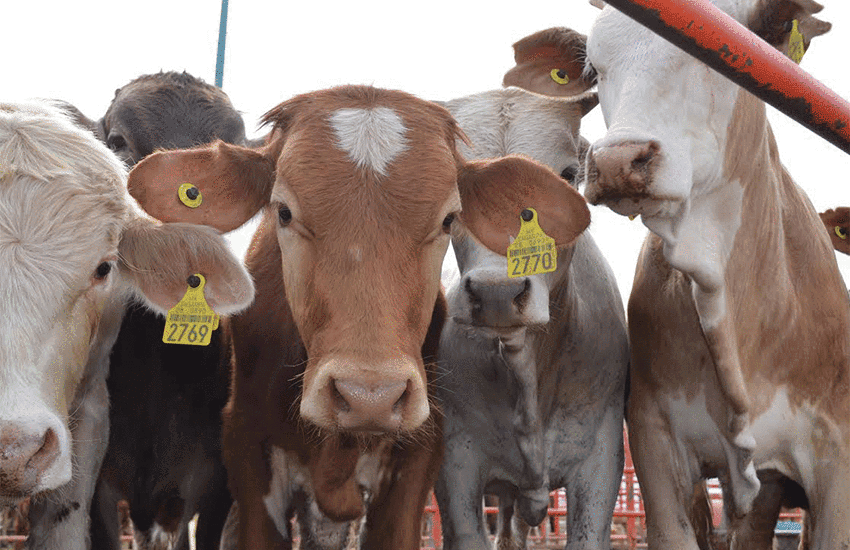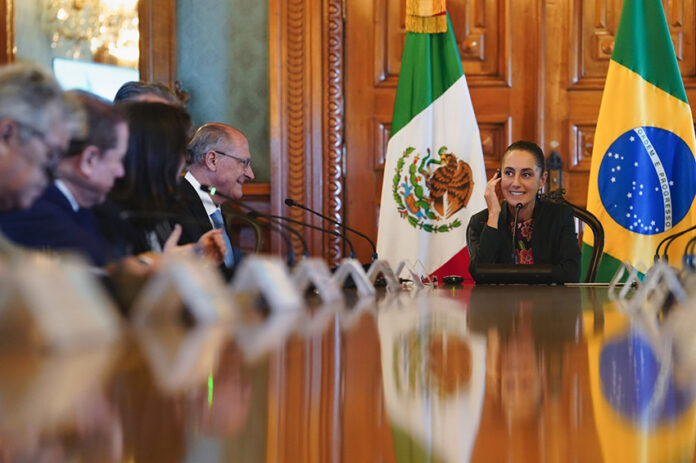Mexico and Brazil signed a plethora of agreements on agriculture, health and biofuels on Thursday, part of a plan to strengthen a trade framework inked more than two decades ago. However, the deals falls short of the trade pact the South American nation hoped to reach.
President Claudia Sheinbaum hosted Brazil’s Vice President Geraldo Alckmin and a contingent of cabinet ministers and business leaders at the National Palace, where the sides negotiated cooperation and regulatory updates.
![]()
In a social media post, Sheinbaum praised the “very productive meetings … held between Mexican and Brazilian authorities and businesspeople to strengthen cooperation in scientific, economic and environmental development.”
Sheinbaum had made clear that Mexico could not extend Brazil any arrangement comparable to the United States-Mexico-Canada Agreement (USMCA), while Alckmin admitted that Brazil is not free to negotiate a broader free trade agreement without going through the Mercosur trade bloc.
In 2002, Mexico and Brazil signed the Economic Complementation Agreement No. 55, which serves as a free trade agreement between Mexico and the Mercosur countries. Though focused on the automotive sector, it aims to foster economic integration and bilateral trade despite the two countries’ separate trade bloc memberships.
Where’s the beef?
Alckmin said Brazil — the world’s largest beef exporter — hopes to ship more cattle meat to Mexico after the U.S. President Donald Trump hit Latin America’s biggest economy with tariffs.
Since Mexico requires “traceability” of livestock, Mexican authorities will visit 14 meatpacking plants in Brazil next month to ensure they meet export standards.
“What we want is for the sale of Brazilian products not to be interrupted while Brazil moves towards traceability, something we agreed on,” Alckmin said, according to the news agency Reuters.
Mexico recently surpassed the U.S. as the No. 2 importer of Brazil’s beef. Between Aug. 1-25, Brazil exported 10,200 metric tons of beef to Mexico worth US $58.8 million, Reuters reported.
Even before the tariffs were imposed, beef shipments to Mexico were growing, according to the Brazilian Beef Exporters Associations (ABIEC). In the first seven months of 2025, Brazil exported 67,659 tons of beef to Mexico, nearly triple the volume from the same period last year.
Reuters reported that ABIEC had highlighted the importance of Mexico’s recent renewal of the Package Against Inflation and High Prices (PACIC), which aims to control inflation.
Luis Rua, secretary of trade at Brazil’s Agriculture Ministry, said Brazilian beef can help keep Mexican inflation in check.

The importation of so much beef begs the question of whether or not Mexico will re-export the meat.
Mauricio Nogueira, director of Brazilian livestock consultancy Athenagro, told Reuters that if Mexico starts sending beef to the U.S., it will likely have to buy Brazilian beef to meet domestic demand. Nogueira suggested Mexico could even triangulate Brazilian beef to the U.S. market.
“We send it to Mexico, but we don’t know exactly what Mexico will do with the meat,” Rua told Reuters.
Additional areas of agreement
While Brazil was focused on beef, Sheinbaum expressed interest in Brazil’s biofuel mandate, which orders more biofuels mixed into fossil fuels. Brazil is renowned for its achievements in the development of bioethanol, sustainable aviation fuels (SAF), biodiesel and sustainable marine fuels.
The result was a declaration of intent to increase cooperation in the production, use, regulation and certification of biofuels, with the goal of growing Mexico’s biofuel sector.
Additionally, Mexico’s Economy Minister Marcelo Ebrard highlighted plans to modernize automotive rules of origin, align sanitary regulations, and explore cooperation in deep-water energy and agriculture.
He also stressed Mexico’s interest in smoother regulatory cooperation and access for Mexican manufactured goods.
The countries signed memorandums of understanding (MOU) on health regulation and science, the latter being a cooperation agreement between Mexico’s Biologicals and Reagents Laboratories and Brazil’s Oswaldo Cruz Foundation.
Trade between the two countries totaled US $13.6 billion in 2024, according to the newspaper The Rio Times, with Mexican exports to Brazil reaching US $5.8 billion.
With reports from Reuters, Milenio, El Financiero, The Rio Times and Bloomberg News
